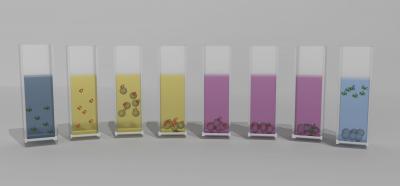Chemists brought mixed folded proteins to life

The alumina nanoparticle-assisted enzyme refolding process is shown. Credit: ITMO University
Proteins, especially including enzymes as accelerators of chemical reactions, are the basis of pharmaceutical and food industries. Meanwhile, 80% of these substances are lost during synthesis. Influenced by unfavorable factors like strong acids, alkalis or heating, proteins denature, that is they lose the native shape and simultaneously any chemical activity.
Thus, the industry seeks for a universal method for recovering protein structure, which could make the production cheaper and more effective. To manufacture enzyme-based drugs and foods on an industrial scale it is especially important to find a way to recover mixtures of proteins as renaturating each particular type of enzymes separately takes a lot of time and is costly and inefficient.
Russian chemists in cooperation with foreign colleagues proposed a solution to this issue. They developed a technology process that gave a second life to proteins having returned their molecules to the original form after denaturation.
In the new research, the chemists unfolded molecules of three enzymes: carbonic anhydrase, phosphatase and peroxidase. Denatured by a strong alkaline, the proteins were mixed with nanoparticles of alumina in water. Due to electrostatic interaction, the enzymes attracted the nanoparticles and engaged them in forming a supramolecular complex with not chemical, but physical bonds.
This shell of nanoparticles protected protein molecules from aggregation enabling the scientists to easily extract them from the aggressive media. Washed from denaturing substances, the enzymes restored their structure by themselves. “Constant exposure of denaturing agents and tendency of curling macromolecules to aggregation are major obstacles for recovering proteins. When removing these factors, we were able to regenerate our objects,” says Katerina Volodina, second year graduate student of International Laboratory “Solution Chemistry of Advanced Materials and Technologies” at ITMO University.
Changing pH, the scientists separated nanoparticles from proteins showing that the substances involved in the experiment can be repeatedly used.
The authors applied their method to a mixture of two enzymes: carbonic anhydrase and phosphatase (CAB and AcP). For these proteins, the portion of renaturated molecules was more than half, which was an unprecedented result. “Renaturating of multiprotein mixtures is a unique process; never been done before. But my colleagues and I believe that further research in this area is in the great interest of pharmaceutical companies right now. Theoretically, our method can simplify and cheapen the manufacture of drugs for Alzheimer's or Parkinson's therapy. Many of these medicines are made of proteins”, notes Katerina Volodina.
Besides its versatility and high performance, the technology proposed by ITMO University's chemists is also fast and low-cost. The scientists are going to evolve the approach mostly to renaturation of proteins in complex mixtures.
###
Reference:
Katerina V. Volodina, David Avnir and Vladimir V. Vinogradov (2017), Alumina nanoparticle-assisted enzyme refolding: A versatile methodology for proteins renaturation, Scientific Reports, http://www.
ITMO University (Saint Petersburg) is a national research university, the leading Russian university in the field of information and photonic technologies. The university is the alma mater of winners of numerous international programming competitions: ACM ICPC (the only seven-time world champions), Google Code Jam, Facebook Hacker Cup, Yandex Algorithm, Russian Code Cup, Topcoder Open etc. Priority research areas: IT, photonic technologies, robotics, quantum communication, translational medicine, urban studies, art&science, and science communication. Starting from 2013, the university has been a member of Project 5-100, which unites top Russian universities to improve their status in the international research and education arena. In 2016 ITMO University became 56th among the world's top universities in Computer Science, according to the Times Higher Education ranking, and scored 3rd among Russian universities in the overall THE ranking.
Media Contact
All latest news from the category: Life Sciences and Chemistry
Articles and reports from the Life Sciences and chemistry area deal with applied and basic research into modern biology, chemistry and human medicine.
Valuable information can be found on a range of life sciences fields including bacteriology, biochemistry, bionics, bioinformatics, biophysics, biotechnology, genetics, geobotany, human biology, marine biology, microbiology, molecular biology, cellular biology, zoology, bioinorganic chemistry, microchemistry and environmental chemistry.
Newest articles

Properties of new materials for microchips
… can now be measured well. Reseachers of Delft University of Technology demonstrated measuring performance properties of ultrathin silicon membranes. Making ever smaller and more powerful chips requires new ultrathin…

Floating solar’s potential
… to support sustainable development by addressing climate, water, and energy goals holistically. A new study published this week in Nature Energy raises the potential for floating solar photovoltaics (FPV)…

Skyrmions move at record speeds
… a step towards the computing of the future. An international research team led by scientists from the CNRS1 has discovered that the magnetic nanobubbles2 known as skyrmions can be…





















